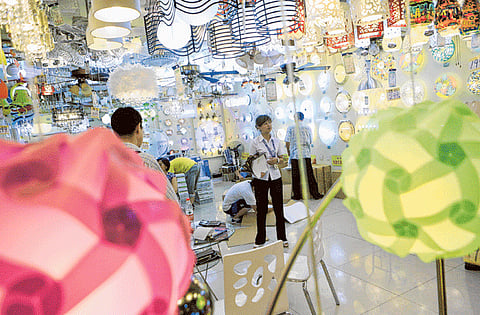China’s measures to support growth
Morgan Stanley estimate China growth this year at 7.5%

Beijing: Chinese Premier Wen Jiabao said the nation has room for fiscal and monetary measures to support growth and will meet this year’s economic goals, triggering gains in Asian stocks.
Morgan Stanley on Wednesday became at least the fifth bank to estimate that China’s economic growth this year will be 7.5 per cent, the same as Wen’s target and the weakest pace in 22 years, after imports slid in August and industrial production cooled. While the premier’s comments encouraged investors, the government may limit stimulus to restrain inflation and bad loans and avoid undoing a campaign to cool the housing market.
“The government has fiscal and monetary war chests to revive growth but there does not seem to be much appetite to roll out a large-scale stimulus package,” said Wang Qinwei, a London-based economist with Capital Economics Ltd who previously worked at the People’s Bank of China.
The MSCI Asia Pacific Index rose 1.1 per cent as of 11:57am in Tokyo, extending the rally over the past five days to more than 4 per cent.
The country has full confidence that it will meet this year’s goals and will continue to place more emphasis on stable growth, Wen said, adding that a “proactive” fiscal policy and a “prudent” monetary stance will continue.
Morgan Stanley follows UBS AG, ING Groep NV, Barclays Plc and Royal Bank of Scotland Plc in lowering its growth estimate to 7.5 per cent. There’s a 20 per cent chance growth will be 7.3 per cent and a 20 per cent probability of 7.7 per cent, Morgan Stanley economists led by Helen Qiao said in a report.
Officials in China have refrained from easing monetary policy since cutting interest rates in June and July and lowering banks’ reserve requirements three times from November to May. Authorities have shied away from stimulus near the scale of a 4 trillion yuan package announced in 2008, amid a global crisis when 20 million migrant workers lost their jobs.
China needs to “moderately lower” interest rates, Li Daokui, a former central bank adviser, told reporters in Tianjin on Tuesday. Growth will pick up in the fourth quarter and China’s new infrastructure investment plans will benefit expansion at the start of next year, he said.
Inflation that accelerated for the first time in five months in August may limit any monetary easing.
The government last week said it approved subway and road projects across the country. Wen last month urged extra measures to support exports and help meet economic targets as a decline in industrial companies’ profits added to evidence that the nation’s slowdown is deepening.
UBS and ING Groep NV on September 7 cut their full-year forecasts for economic expansion to 7.5 per cent. The deceleration in China’s growth will probably extend into a seventh quarter, based on projections from ING and Bank of America Corp
Asia’s biggest economy expanded 7.6 per cent in the second quarter from a year earlier, the slowest pace in three years, after the government moved to counter inflation and surging property prices in the wake of the 2008 stimulus.
The last stimulus resulted in a “large hangover in the form of worries about bad debt and overinvestment,” said Wang of Capital Economics. “The authorities are now increasingly aware that stimulus only worsens China’s economic imbalances.”
Europe’s debt crisis and anaemic US growth may hinder a rebound in exports while at home a slump in earnings is deterring companies from spending and banks face rising bad debts.
Downward Pressure
President Hu Jintao said September 8 that economic expansion faces “notable downward pressure,” some small and mid-sized companies are “facing a hard time and exporters are facing more difficulties.”
Companies including China Cosco Holdings Co., China’s largest listed shipper, are bearing the brunt of weakness in exports. The company lost 4.87 billion yuan in the first half and its top two executives pledged to waive their salaries until profits resume.
China’s exports rose less than 3 per cent for a second month in August while imports had the first non-holiday decline since 2009 as the nation’s slowdown and Europe’s turmoil curbed demand at home and abroad. At the same time, new yuan loans were the highest of any August on record.



